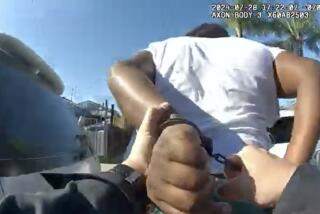When Traffic Stops Become Racial Issue
- Share via
MIAMI — Aaron Campbell could see the sheriff’s patrol car ahead of him in the April twilight, parked just south of a turnpike overpass.
He wasn’t worried. His Ford Explorer was on cruise control, just under the speed limit. But then, moments later, he saw flashing lights in his rear-view mirror, and he pulled to the side.
“Since I know the police procedures, I remained in the car,” Campbell said. “Officers like for you to stay in the car. I let my window down to hear his instructions.”
Campbell knew the procedures because he is a police officer--a 25-year veteran of the Metro-Dade Police Department. He would explain to the deputy that he was a fellow officer, that he had broken no laws. There was no reason for concern.
But there was reason for concern.
Campbell is black. The deputy was white. And after Campbell got out with his driver’s license, the traffic stop quickly spun out of control. It ended with Campbell being doused with pepper spray and stumbling onto the turnpike before he was wrestled to the ground.
Campbell, a police major, faces charges of felony assault and resisting arrest with violence. Months before his retirement, he was suspended without pay.
And the controversy over whether race is being used as a reason to make traffic stops--whether motorists are being pulled over for what critics call “driving while black”--flared anew.
Police consider many factors when making a stop, such as “something being not quite right, almost a sixth sense,” said Stephen Hennessy, a veteran police officer and cultural awareness trainer for the International Assn. of Chiefs of Police in Alexandria, Va.
But he concedes some departments “are in a little bit of trouble in how they deal with individuals and constitutional rights.”
When Campbell got out of his car on April 9, driver’s license in hand, he identified himself as a fellow officer. Orange County Cpl. Richard Mankewich, who is white, told Campbell that he’d made an improper lane change by not signaling before cutting in front of a truck. Mankewich also noted, as a video camera on his dashboard silently whirred, that Campbell’s license tag was partially obscured.
That’s when Campbell blew his cool.
“I obey the law, don’t be ---- with me,” Campbell told Mankewich. He snatched his license back from Mankewich, referring to him with a vulgarity.
“Immediately I recognized what was happening,” Campbell later told Associated Press.
“I frequently travel up to the house that I’m building. I see these guys profiling”--pulling drivers over because they exhibit certain characteristics that are deemed suspicious--”every time I come up. I knew what they were doing. For some reason they stopped me.”
Campbell still had a gun in his pouch. He could see that the situation was growing dangerous. He retreated to sit on the guardrail and demanded that Mankewich call for a supervisor.
“I am the supervisor,” Mankewich replied, and he called for backup.
Soon, reinforcing officers approached from behind the seated Campbell as Mankewich warned them that Campbell was armed. One blasted Campbell with pepper spray; he was chased onto the highway and arrested.
“I was confused and bewildered,” Campbell said. “They said I was fleeing. I was trying to get away from that spray.”
Orange County officials deny they use profiling. They say Mankewich, who was working on a drug squad that occasionally gives traffic tickets, had no way of knowing Campbell was black because the Explorer’s windows were tinted. Mankewich said he only planned to write a warning ticket.
“It doesn’t matter who you are. We’ve arrested our own in the past,” spokesman Robert Larson said. “If they’re in the wrong, they are going to pay the price. Police officers are not above the law.”
The courts will determine whether Campbell is a criminal or a victim. But the larger issue--whether police are unduly using race in looking for criminals--is far from settled.
National statistics haven’t been collected, but a survey of such stops from the state of Maryland to Florida’s Volusia County showed minority drivers were stopped disproportionately.
The U.S. Supreme Court in June 1996 ruled that police can pull someone over for a traffic violation, even when looking for evidence of more serious offenses such as drug possession.
The ruling did not allow for stops based on race, but said objections in such cases must be based on equal-protection guarantees in the Constitution, a standard that can be difficult to prove.
Campbell, for one, has no doubt that this kind of thing is both common and unacceptable. He got some encouragement recently from Metro-Dade commissioners, who honored him in July for 26 years of distinguished police service and for his work with young people in public housing.
“I truly resented the reason I was stopped,” he said. “Being a black person in this country, I know the experiences we go through. These guys routinely violate the rights of black men. We’re supposed to be subservient and accept it.”
More to Read
Sign up for Essential California
The most important California stories and recommendations in your inbox every morning.
You may occasionally receive promotional content from the Los Angeles Times.










